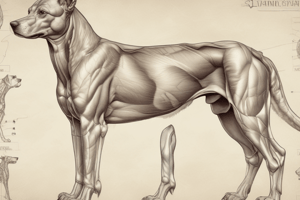Podcast
Questions and Answers
What is the function of the patella in the stifle joint?
What is the function of the patella in the stifle joint?
- To stabilize the extensor mechanism alignment with the femoral shaft and trochlear groove (correct)
- To facilitate hip flexion
- To aid in the insertion of the quadriceps muscles
- To provide stability during medial and lateral trochlear ridge movement
Which muscles are part of the extensor apparatus of the stifle joint?
Which muscles are part of the extensor apparatus of the stifle joint?
- Biceps femoris, Semitendinosus, Semimembranosus
- Gracilis, Sartorius, Pectineus
- Adductor magnus, Gluteus medius, Tensor fasciae latae
- Rectus femoris, Vastus medialis, lateralis, intermedius (correct)
What is the clinical significance of patella luxation in cats?
What is the clinical significance of patella luxation in cats?
- It often presents bilaterally in cats (correct)
- It is usually associated with hip dysplasia in cats
- It is less common in cats compared to dogs
- It is more frequently observed in older cats
What is the most common form of patella luxation in cats?
What is the most common form of patella luxation in cats?
Which breed is commonly reported to be predisposed to patella luxation?
Which breed is commonly reported to be predisposed to patella luxation?
What is the overall complication rate for surgical treatment of patella luxation?
What is the overall complication rate for surgical treatment of patella luxation?
What type of patella luxation is more common in cats, bilateral or unilateral?
What type of patella luxation is more common in cats, bilateral or unilateral?
Which type of patella luxation is more common in dogs and cats?
Which type of patella luxation is more common in dogs and cats?
What type of patients benefit from surgical treatment of patella luxation?
What type of patients benefit from surgical treatment of patella luxation?
What is the association between patella luxation and hip luxation in cats?
What is the association between patella luxation and hip luxation in cats?
What is the recommended postoperative activity restriction period for patients undergoing surgical treatment for patella luxation?
What is the recommended postoperative activity restriction period for patients undergoing surgical treatment for patella luxation?
Which type of patella luxation is more common in small breed dogs?
Which type of patella luxation is more common in small breed dogs?
What is the range of the clinical grading system for patella luxation?
What is the range of the clinical grading system for patella luxation?
What is a characteristic of extensor malalignment in medial patella luxation (MPL)?
What is a characteristic of extensor malalignment in medial patella luxation (MPL)?
What does the diagnosis of patella luxation involve?
What does the diagnosis of patella luxation involve?
What is included in the orthopedic examination for patella luxation?
What is included in the orthopedic examination for patella luxation?
What is trochleoplasty?
What is trochleoplasty?
What is tibial tuberosity transposition used for in the surgical treatment of patella luxation?
What is tibial tuberosity transposition used for in the surgical treatment of patella luxation?
What is the aim of surgical procedures for patella luxation?
What is the aim of surgical procedures for patella luxation?
What are the types of trochleoplasty techniques mentioned in the text?
What are the types of trochleoplasty techniques mentioned in the text?
What does traumatic patella luxation involve?
What does traumatic patella luxation involve?
Flashcards are hidden until you start studying
Study Notes
Patella Luxation in Dogs: Diagnosis and Surgical Treatment
- Patella luxation is classified as medial (MPL) or lateral (LPL) and can be non-traumatic, traumatic, or iatrogenic
- MPL is more common in small breed dogs, while LPL is more common in large breed dogs
- Extensor malalignment in MPL is characterized by femur deformities, shallow trochlear groove, and genu varum
- Traumatic patella luxation involves tears in the retinaculum, while non-traumatic luxation leads to retinaculum fibrosis
- The clinical grading system for patella luxation ranges from grade I (patella resides in the groove) to grade IV (permanently luxated and cannot be manually reduced)
- Concurrent abnormalities associated with patella luxation include cranial cruciate ligament (CrCL) tear and angular deformities
- Diagnosis of patella luxation involves orthopedic examination, stability tests for CrCL tears, and diagnostic imaging such as radiography
- Orthopedic examination includes palpation for luxation, assessment of CrCL stability, and examination maneuvers for MPL and LPL
- Surgical treatment for patella luxation is grade and symptom-based and may involve trochleoplasty, tibial tuberosity transposition, and soft tissue adjustments
- Trochleoplasty techniques include recession trochleoplasty, abrasion trochleoplasty, and trochlear chondroplasty, with variations in surgical procedures
- Tibial tuberosity transposition is a common surgical technique to correct patella luxation, addressing underlying contributing factors
- Surgical procedures aim to address the underlying contributing factors, such as shallow trochlear groove and concurrent angular limb deformities
Studying That Suits You
Use AI to generate personalized quizzes and flashcards to suit your learning preferences.




